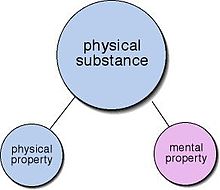Property dualism

Property dualism describes a category of positions in the philosophy of mind which hold that, although the world is composed of just one kind of substance—the physical kind—there exist two distinct kinds of properties: physical properties and mental properties. In other words, it is the view that at least some non-physical, mental properties (such as thoughts, imagination and memories) exist in, or naturally supervene upon, certain physical substances (namely brains).
Substance dualism, on the other hand, is the view that there exist in the universe two fundamentally different kinds of substance: physical (matter) and non-physical (mind or consciousness), and subsequently also two kinds of properties which inhere in those respective substances. Both substance and property dualism are opposed to reductive physicalism. Notable proponents of property dualism include David Chalmers, Christof Koch and Richard Fumerton.[1][2][3] It became prominent in the final decades of the twentieth century and is now the leading alternative to physicalism.[4]
Epiphenomenalism is viewed as a form of property dualism.
Definition
[edit]Property dualism posits the existence of one material substance with essentially two different kinds of property: physical properties and mental properties.[5] It argues that there are different kinds of properties that pertain to the only type of substance, the material substance: there are physical properties such as having colour or shape and there are mental properties like having certain beliefs or perceptions.[5]
Epiphenomenalism
[edit]Epiphenomenalism is a doctrine about mental-physical causal relations which holds that one or more mental states and their properties are the by-products (or epiphenomena) of the states of a closed physical system, and are not causally reducible to physical states (do not have any influence on physical states). According to this view, mental properties are as such real constituents of the world, but they are causally impotent; while physical causes give rise to mental properties like sensations, volition, ideas, etc., such mental phenomena themselves cause nothing further - they are causal dead ends.[6]

The position is credited to English biologist Thomas Huxley (Huxley 1874), who analogised mental properties to the whistle on a steam locomotive. The position found a level of favor amongst some scientific behaviorists over the next few decades, which then dove in response to the cognitive revolution in the 1960s.
Epiphenomenal qualia
[edit]In the paper "Epiphenomenal Qualia" and later "What Mary Didn't Know" Frank Jackson made the so-called knowledge argument against physicalism. The thought experiment was originally proposed by Jackson as follows:
Mary is a brilliant scientist who is, for whatever reason, forced to investigate the world from a black and white room via a black and white television monitor. She specializes in the neurophysiology of vision and acquires, let us suppose, all the physical information there is to obtain about what goes on when we see ripe tomatoes, or the sky, and use terms like 'red', 'blue', and so on. She discovers, for example, just which wavelength combinations from the sky stimulate the retina, and exactly how this produces via the central nervous system the contraction of the vocal cords and expulsion of air from the lungs that results in the uttering of the sentence 'The sky is blue'. [...] What will happen when Mary is released from her black and white room or is given a color television monitor? Will she learn anything or not?[7]
Jackson continued:
It seems just obvious that she will learn something about the world and our visual experience of it. But then it is inescapable that her previous knowledge was incomplete. But she had all the physical information. Ergo, there is more to have than that, and Physicalism is false.[7]
Other proponents
[edit]Saul Kripke
[edit]Saul Kripke has a well-known argument for some kind of property dualism.[8] Using the concept of rigid designators, he states that if dualism is logically possible, then it is the case.
Let 'Descartes' be a name, or rigid designator, of a certain person, and let 'B' be a rigid designator of his body. Then if Descartes were indeed identical to B, the supposed identity, being an identity between two rigid designators, would be necessary.
See also
[edit]- "What Is It Like to Be a Bat?"
- Chinese room
- Explanatory gap
- Functionalism (philosophy of mind)
- Physicalism
- Qualia
Notes
[edit]- ^ Bratcher, Daniel (1999). "David Chalmers' Arguments for Property Dualism". Philosophy Today. 43 (3): 292–301. doi:10.5840/philtoday199943319.
- ^ Slagle, Jim (2015). "Knowledge, Thought, and the Case for Dualism". International Journal of Philosophical Studies. 23 (5): 776–779. doi:10.1080/09672559.2015.1099972.
- ^ Owen, Matthew (2018). "Dusting Off Dualism?". American Philosophical Association.
- ^ Weir, Ralph Stefan (2024). The mind-body problem and metaphysics: an argument from consciousness to mental substance. Routledge studies in contemporary philosophy. New York (N.Y.): Routledge. pp. 2–3. ISBN 978-1-032-45768-0.
- ^ a b Vintiadis, Elly (2019). "Property Dualism". Rebus Community. Archived from the original on September 25, 2024.
- ^ Churchland 1984, p. 11
- ^ a b Jackson 1982, p. 130
- ^ Jacquette, Dale (1987). "Kripke and the Mind-Body Problem". Dialectica. 41 (4): 293–300. JSTOR 42970584.
References
[edit]- Churchland, Paul (1984). Matter and Consciousness.
- Davidson, D. (1970) "Mental Events", in Actions and Events, Oxford: Clarendon Press, 1980
- Huxley, Thomas. (1874) "On the Hypothesis that Animals are Automata, and its History", The Fortnightly Review, n.s. 16, pp. 555–580. Reprinted in Method and Results: Essays by Thomas H. Huxley (New York: D. Appleton and Company, 1898)
- Jackson, F. (1982) "Epiphenomenal Qualia", The Philosophical Quarterly 32: 127-136.
- Kim, Jaegwon. (1993) "Supervenience and Mind", Cambridge: Cambridge University Press.
- MacLaughlin, B. (1992) "The Rise and Fall of British Emergentism", in Beckerman, et al. (eds), Emergence or Reduction?, Berlin: De Gruyter.
- Mill, John Stuart (1843). "System of Logic". London: Longmans, Green, Reader, and Dyer. [8th ed., 1872].
